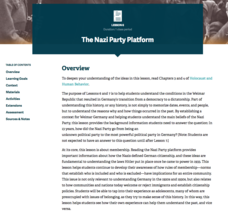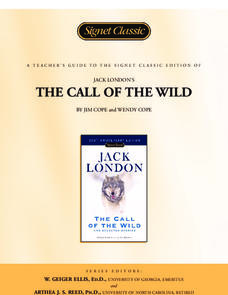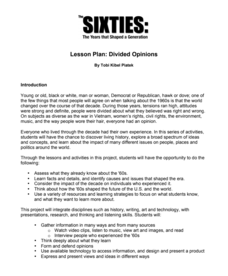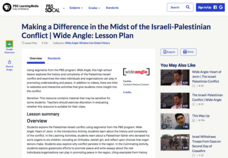Facing History and Ourselves
The Nazi Party Platform
Not all party platforms stay democratic. A resource covers many political issues in Germany during the time of World War II, and teaches pupils about the Nazi party platform and what went wrong. Individuals participate in a warm-up...
Council for Economic Education
China - Where Will They Fit in the World Economy?
Teach scholars why China is so crucial to global economics through an informative resource. Activities include using databases to search for information, watching a video or listening to a podcast, and reading about China's economy as a...
Insurance Zebra
Insurance Curriculum for Middle and High School Teachers
Liability, deductible, premium ... what do these words mean, and how do they relate to insurance? Scholars complete a pre-test, matching vocabulary activity, and insurance timeline worksheet and become familiar with these terms. Next,...
Penguin Books
A Teacher's Guide to the Signet Classics Edition of Jack London's The Call of the Wild
The Yukon provides plenty of opportunity for adventure. A study guide for The Call of the Wild by Jack London, also the author of White Fang, helps readers navigate the novel which is set in Yukon, Canada. Chapter summaries give a quick...
Benjamin Franklin Tercentenary
The Junto Meets Again
Out of the classroom and into the streets! With Ben Franklin’s Junto society as inspiration, learners develop their ideas for improving their communities and put them into action. After analyzing meeting notes to discover what the Junto...
Country Music Hall of Fame
Ray Charles and Country Music
Ray Charles used the pain and adversity from his life to influence an entire genre of American music. Learn about the musician's daily life, struggles and success, and powerful musical style with a thorough resource.
PBS
Lesson Plan: Divided Opinions
To gain a more in-depth understanding of the tumultuous 1960s, young historians examine video clips, listen to music, examine images, and interview survivors. Once they have a foundation of information about the period, class members...
Teach It History
Crisis in Berlin: Decisions Game!
The Cold War did not begin with a bang, but with a swift tactic that reflected the Soviet Union's growing distrust of its former Allies. High schoolers choose either the USA or the USSR in a role play activity as they analyze why each...
Complete College America
The Marshmallow Reading/Writing Project
Which option would most children choose: One marshmallow now, or two marshmallows in 10 minutes? Learners watch the social experiment on video and discuss their observations. They then read articles and work in small groups to analyze...
Independence Hall Association
American History: From Pre-Columbian to the New Millennium
Need an online resource to supplement the paper textbook in your classroom? An all-encompassing website covers historical events throughout the last half of the second millenium, leading right up to the third. From the pre-Columbian...
Tidewater Community College
Assignment: The “Big Mac” Index
Young economists learn about the method of predicting changes in the exchange rate with Big Macs in an instructional video. After an understanding the index, learners write a post on a discussion board and respond to class members' posts...
Newseum
Editorials and Opinion Articles
Reading the news is fun, and that's a fact! With the lesson plan, scholars differentiate between fact and opinion as they read editorial articles. They complete a worksheet to analyze the information before writing their own editorials...
Newseum
Putting the Consumer's Questions to Work
Who, what, when, where, why, and how are good questions to ask when evaluating a source. First, scholars find two sources of information relating to a chosen topic. Next, pupils complete a worksheet to gauge the source's credibility....
Newseum
Can I Trust the Creators?
It's easy to find information at the click of a mouse, but is it trustworthy? Pupils learn about the E.S.C.A.P.E. acronym for evaluating sources. Next, learners read a news story and evaluate its sources to determine credibility. Last,...
Franklin Covey
The Habits of Highly Effective Teens
Sally and Joe both want the last cookie in the jar, so they split it in half. That's an example of a win-win situation, one of the many principles Sean Covey outlines in his book The 7 Habits of Highly Effective Teens. Using the...
Equality and Human Rights Commission
Taking Action
The Universal Declaration of Human Rights passed in 1948 when the majority of members of the United Nations voted in favor of the resolution. Scholars use their knowledge of human rights to determine ways they personally can help promote...
Equality and Human Rights Commission
How Do Human Rights Work?
Do human rights apply to children? Scholars learn of three children asking for help to determine their rights and how to handle specific situations. Class members must research any laws pertaining to the requested right and how the...
Equality and Human Rights Commission
Equality
Despite passing the Equality Act in 2010 covering many groups, gender inequality in Great Britain remains. Scholars investigate the concept of equality with a presentation, discussion, and hands-on timeline activities. The seventh lesson...
Media Smarts
Forensic Science Crimes Dramas
How do TV shows present criminology—is it realistic? High schoolers research crime dramas and participate in class discussion about topics such as who exists as the target audience and the values the shows communicate. They also research...
Judicial Learning Center
Rule of Law WebQuest
Go on a WebQuest to find the Rule of Law! Scholars use the Internet to learn all about how law works in a democracy and how the Rule of Law relates to both American government and governments around the world. Researchers then engage in...
Oxford University Press
Crisis at Fort Sumter
The crisis at Fort Sumter and events related to criminology create an intriguing activity for high schoolers. When clicked on, each box goes into a different part of the event. It also includes the aftermath of the battle in American...
Newseum
Slanted Facts and Slippery Numbers
The Internet is known as the information superhighway, but sometimes it's hard to know when to hit the brakes on unreliable sources. Using a well-rounded lesson plan, pupils read and summarize articles about the gender pay gap and...
Newseum
Evidence: Do the Facts Hold Up?
Sometimes it's hard to escape bad information! Pupils learn the E.S.C.A.P.E. method for evaluating news sources and complete a worksheet to assess a news article using their new skills.
PBS
Making a Difference in the Midst of the Israeli-Palestinian Conflict
What can individuals do to give peace a chance in the Middle East? Through a series of activities including viewing segments from a PBS video, class members learn about the complex history of the conflict and about efforts to promote...

























